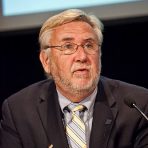2016 Herzberg Lecture – Wetlands: The Kidneys of our Planet by Dr.William J. Mitsch
2016 Herzberg Lecture – Wetlands: The Kidneys of our Planet by Dr.William J. Mitsch
Categories: General, Lectures and Seminars | Intended for Anyone

Second Level Residence Commons
1125 Colonel By Dr, Ottawa, ON
Contact Information
Rima Mattar, 8760, rima.mattar@carleton.ca
Registration
Cost
$0
About this Event
Host Organization: Carleton Science- Institute of Environmental Science
The world is faced with unprecedented threats to our aquatic ecosystems from excessive nutrients, particularly nitrogen and phosphorus, caused by agricultural and urban runoff and discharges.
The world is faced with unprecedented threats to our aquatic ecosystems from excessive nutrients, particularly nitrogen and phosphorus, caused by agricultural and urban runoff and discharges. In addition carbon is increasing in our atmosphere leading to climate shifts and rising sea levels. In the meantime, it has been estimated that, on a global scale, we have lost half of our original wetlands, most of that loss in the 20th century. I am proposing here a significant increase in our wetland resources around the world, solving the diminishing wetland habitat loss problem, but with the strategic purpose of minimizing the excess phosphorus, nitrogen in our lakes, rivers and estuaries and sequestering carbon in our atmosphere, both in a sustainable fashion. Examples presented will include: 1. attempts to minimize phosphorus inflows to the Florida Everglades with wetlands to protect both the Florida Everglades and Florida’s coastlines; 2. a proposal to restore the Black Swamp in NW Ohio to minimize eutrophication of Lake Erie in the Laurentian Great Lakes; 3. wetland and bottomland riparian forest restoration in the U.S. Midwest to mitigate a 15,000 km2 hypoxia in the Gulf of Mexico: and 4. conservation and enhancement of tidal mangroves for their capacity to sequester carbon from the atmosphere with fewer emissions of methane than freshwater wetlands (blue carbon).
Register For this Event
250 spaces capacity, 79 spot(s) left.